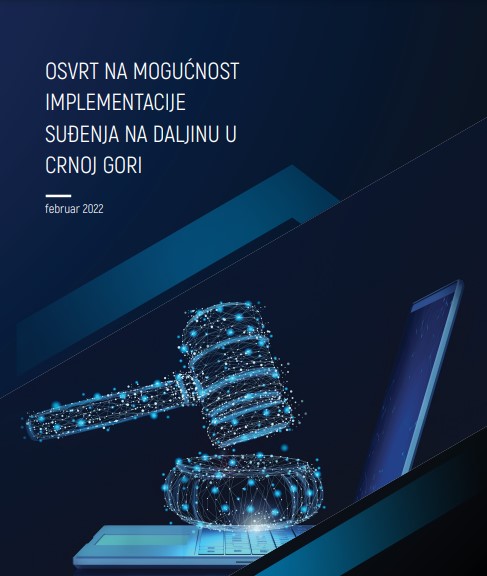As a candidate country for membership of the European Union, Montenegro opened Chapter 23 – Judiciary and Fundamental Rights on 18 December 2013. Nine years later, Montenegro is still only ‘moderately prepared’ to implement the EU acquis. According to the latest report of the European Commission, issued in 2021, Montenegro had made no progress in the area of the judiciary from the previous year. The implementation of key reforms is stagnating, which is largely the result of the political crisis and an inability to secure the necessary majority in the Parliament to adopt reform laws and unblock key institutions. This has had a domino effect on other aspects of the judiciary, including shortcomings in efforts to resolve some of the key problems affecting the efficiency of the judicial apparatus.
This study deals precisely with the problem of judicial efficiency, not from the political aspect, but from the aspect of the digitalization of justice and the introduction of innovative methods of conducting judicial proceedings, and it is inspired by the effects of the COVID-19 pandemic on the functioning of judicial systems around the world. During the pandemic, judicial systems were faced with a dilemma between the complete closure of the courts, which would have had inconceivable consequences for the system protecting human rights, and innovative solutions such as remote hearings (online trials). The prevailing view was to ensure the smooth conduct of court proceedings through an online service, thus avoiding the exposure of any participant in the proceedings to the risk of infection. Many EU countries implemented such solutions in their own national legal systems, and this helped to reduce the consequences of the pandemic on the functioning of the judiciary to a minimum.
This study was created as a result of qualitative research within the ‘Online Trial – The Pathway to Efficient Judiciary’ project that was implemented by CeMI with the financial support of the Balkan Trust for Democracy, a project of the German Marshall Fund of the United States and the United States Agency for International Development (USAID). The project aims to contribute to the creation of the environment necessary for the implementation of remote hearings in Montenegro, in order to solve longstanding problems of judicial efficiency which were exacerbated by the COVID-19 pandemic.
The study is intended primarily for legal practitioners and holders of judicial office, but it may also benefit the general public, bearing in mind that the citizens are participants in court proceedings. The study presents the concept of remote hearings and its advantages and disadvantages, as well as the most important international standards for fair trial in the context of remote hearings and the practice of the European Court for Human Rights in Strasbourg. The study also provides a comparative overview of the state of the judiciary in the EU countries during the pandemic, the way in which remote hearings were implemented, and the effects of remote hearings in these countries. The study describes the efforts of the Montenegrin judiciary to improve its digitalization. The study ends with the conclusions and recommendations reached by CeMI during the research.
The goal of this study is to provide the stakeholders with a set of recommendations for legislative changes, such as recommendations aimed at achieving the other preconditions necessary for the implementation of online trials in Montenegro. With this study, CeMI aims to present, to the representatives of the judiciary and the general public, the benefits of this type of hearing as one of the elements of the digitalization of the judiciary, and at the same time to familiarize them with the potential problems in the implementation of a new and innovative system for conducting court proceedings in Montenegro.
